Tara Chevrestt's Blog, page 47
August 26, 2014
The Summer Queen: Eleanor Grows Into Her Power
My main motivation for wanting to read The Summer Queen by Elizabeth Chadwick was my interest in reading about Eleanor of Aquitaine on crusade in fiction. There is a story that is apparently legend, rather than fact, that this queen led a troop of female knights on crusade to the Holy Land. One article about Eleanor that contains this story is Female Hero: Eleanor of Aquitaine. I was looking for a more realistic fictional version of this period in Eleanor’s life. One reason why I gave a pass to Christy English’s novel about the early life of Eleanor of Aquitaine, To Be Queen, is that I read a review on Goodreads which stated that English’s novel glossed over the crusade. I am glad I chose Chadwick instead. I downloaded The Summer Queen from Net Galley, and this is my review.
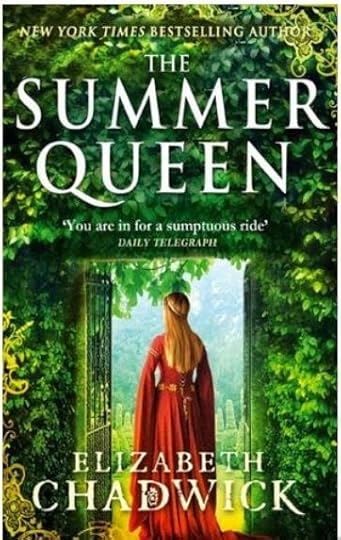
I hadn’t read any of Elizabeth Chadwick’s work since Daughters of the Grail, a novel dealing with the Cathars utilizing some sources that Dan Brown later made famous in The Da Vinci Code. (For a scholarly approach to the Cathars see The Cathar Mary Magdalene and the Sacred Feminine) Yet I’ve received good reports of Chadwick’s scholarship since then.
The first thing I noticed when I began to read The Summer Queen demonstrated her interest in accuracy. Chadwick used the medieval spelling of her central character’s name, Alienor. I hope readers will forgive me if I continue to use the familiar modern spelling in this review. Another nice touch that showed Chadwick’s research was that when Eleanor sought an annulment of her first marriage, she prayed to St. Radegund, who established a monastery in Poitou and was buried there. Eleanor was the Countess of Poitou in addition to being Duchess of Aquitaine. It seems to me that Eleanor would have preferred a saint that was associated with the lands that belonged to her.
By the time I finished The Summer Queen I realized that character development in this book had been well-handled . Eleanor’s first husband, Louis of France, could easily have been portrayed as a stereotype of medieval piety. Chadwick gives him more depth by showing us the incidents that motivated him. Louis is by no means admirable, but his attitudes are understandable given his history. I hadn’t expected to like the young Henry of Anjou who would later become Henry II King of England, because I knew that he would later mistreat Eleanor. Despite this foreknowledge, he managed to charm me as a reader while he was doing his best to captivate Eleanor. He was such a contrast to Louis that it’s no wonder that Eleanor initially felt liberated by her second marriage. This couldn’t last because Eleanor and Henry were strong personalities accustomed to wielding power. It was inevitable that they would clash. In the novel, Eleanor’s new mother in law, the Empress Mathilde, warns Eleanor of the fact that the men of her husband’s line are unwilling to share power. Eleanor would end up finding this out the hard way.
The next two volumes of Chadwick’s trilogy deal with territory that is more familiar to me, but I confess to wanting to experience Eleanor’s novelistic perspective on Becket’s murder in the cathedral. So perhaps I will be visiting with Chadwick’s version of Eleanor in the future.

Published on August 26, 2014 00:00
August 25, 2014
Wife Number Seven by Melissa Brown
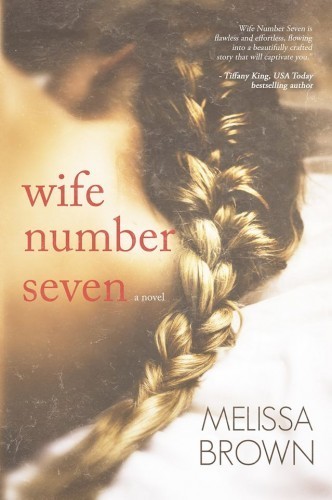 I absolutely enjoyed this story. I've been on the hunt for a different read lately. I enjoy the typical romance, but I needed something different. This was it.
I absolutely enjoyed this story. I've been on the hunt for a different read lately. I enjoy the typical romance, but I needed something different. This was it. I enjoy the show Sisterwives and it intrigues me the way these women live. I want to say, this book is nothing like the show Sisterwives. The wives are not good friends like you see in the show. They don't get to live normal lives. A prophet tells them how to live each day. They wear no make-up, never cut their hair, must wear dresses that cover everything, and live on a compound. They are expected to have child after child until they can't have children anymore.
Brinely, however, likes to visit the outside world, and one day comes upon an exiled man from her community. One touch from him and she discovered what she's been missing. One touch from him, and something new is born. But she can't just leave her home and compound. All she's ever known is the life she lives and as far as she knows, if she leaves that compound, she'd going to hell. But she realizes she is sinning from her thoughts, and she had to decide to redeem herself or not.
This is a very heart felt story. I was engrossed from the time I started it. I really enjoyed it and will be reading this author again.

Lipstick. Bright, red lipstick. Nothing but lipstick.
Even though it’s against our faith to wear a color that screams of sexual promiscuity and deviant behavior, I’m not allowed to protest. But, I want to. So badly.
You see, there’s more to me than the braid that spills down my back.
More to me than the layers of heavy fabric that maintain my modesty. And so much more than the oppressive wedding band that adorns my finger--the same band that each of my sister wives wear. So much more. To protest would be sinful. I must keep sweet, that is my duty.
So I’ll wear the lipstick. I’ll do as I’m told.
And I’ll do my best to silence the resistance within me, to push him from my mind. If only my heart would do the same.
Published on August 25, 2014 00:00
August 24, 2014
How To Marry a Millionaire: Craptastic Storyline, But Fabulous Fashions
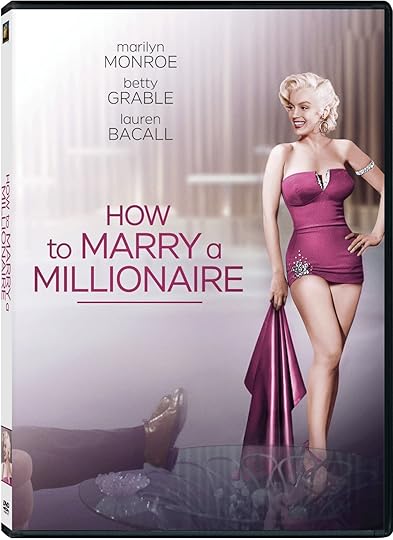 Yes, yes, I actually watched this. *hangs head in shame* And yes, it's a story about three women who are fashion models and want nothing more in life than to find rich men to marry. That's it. They model clothes, sell furniture that isn't theirs to their rent, and try to find men, 'cause they are incapable of caring for themselves. A feminist's nightmare.
Yes, yes, I actually watched this. *hangs head in shame* And yes, it's a story about three women who are fashion models and want nothing more in life than to find rich men to marry. That's it. They model clothes, sell furniture that isn't theirs to their rent, and try to find men, 'cause they are incapable of caring for themselves. A feminist's nightmare.(In my defense, it was free on Prime and it has William Powell in it, and I have this huge crush on that debonair, sexy actor.)
But OMG, the clothes! The clothes stole the showmovie, in my opinion. And today I'm just doing this absolutely horribly girly thing and just going ahead and nattering about it.
 Because I'm a vintage fashion fanatic. I don't get into that much here on Book Babe, but what the heck, it's actually a cute movie with some good points: 1. It's okay to be a girl and wear glasses! Quit worrying about how "unattractive" it makes you and find a man who appreciates you for you, glasses, weight gain, gnarly hair, pimples, whatever. 2. Money is nice, but love is better!
Because I'm a vintage fashion fanatic. I don't get into that much here on Book Babe, but what the heck, it's actually a cute movie with some good points: 1. It's okay to be a girl and wear glasses! Quit worrying about how "unattractive" it makes you and find a man who appreciates you for you, glasses, weight gain, gnarly hair, pimples, whatever. 2. Money is nice, but love is better!But back to the clothes. What I wouldn't give for some of these dresses, especially the ones Betty Grable wore. I guarantee they look way better when you actually watch the movie, and in color.
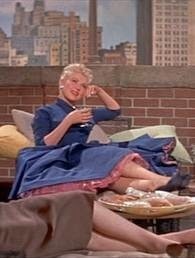
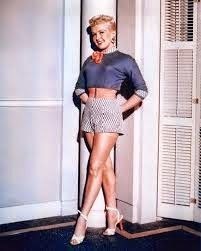
And I am not a fan of Marilyn Monroe..okay? Well, let me take that back. I don't care for the roles she played, but that's not saying she wasn't a decent actress. And I don't care for how she is portrayed as a two-bit whore. Maybe she wasn't one. Regardless, I think she did a good job in this. She plays this young woman who does dumb things because she can't see without her glasses and she's so afraid she won't attract a man, she doesn't wear them. And while I rolled my eyes at this at first, I actually appreciated this tiny storyline. I was once a girl who was embarrassed to show my hearing aid, who tried to hide it under my hair all the time, so I get it.
Anyway, she actually plays the most amusing character, even though the star is Lauren Bacall.
And she absolutely stuns in this purple dress. (I have no copyright to these images. They are merely posted everywhere online.)
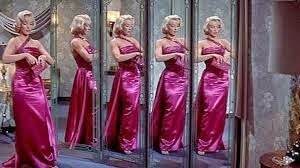
I'm not a fan of Lauren either. (May she rest in peace. I actually feel bad now in light of her passing last month). Her husky, man-like voices gets on my nerves for some reason. (I played the sound straight from the Kindle into my hearing aid, for those who raised their eyebrows at that.) And her character in this movie stinks, but I tell ya if I ever marry again for whatever reason, I'm getting this wedding dress remade.
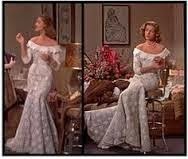
You know what? Long review short, sometimes we have to just set aside feminism and enjoy a good "chick flick" and I'd call this a classic chick flick. It's def one I see having girlfriends over (assuming I actually had any in person), popping the cork off a bottle of pink wine, and sitting down and watching.
I found this to be a fun film. It wasn't as funny as I expected, but I did laugh a few times, and as I said above, after having watched it, I appreciated the morals, however small they were in the big scheme of things. And hey, we need to bring back the fishtail!
So, what are some movies you are almost ashamed to have enjoyed for whatever reason?
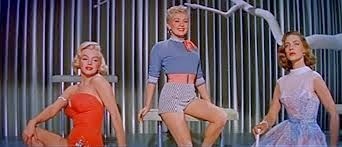

Published on August 24, 2014 00:00
August 23, 2014
The Reading Radar 8/23/2014
What hit the radar and wishlist this week? Let's see....Spotted on GR giveaways, When the Dawn Breaks by Emma Fraser came to my attention.
 Two women. One secret. A heart-breaking choice. Skye, 1903. Jessie, the young daughter of a local midwife, is determined to become a nurse one day, but family loss and heartache jeopardise her dreams. Isabel, the doctor's daughter, is planning to follow in her father's footsteps - even though medicine is not considered a fitting career for a woman. And then there's Archie, Jessie's older brother, who Isabel just can't stay away from. Following an unsettling encounter in the woods, Archie disappears, and all their lives are irrevocably changed ...Years later, Isabel is a qualified doctor and Jessie is a nurse and when their paths cross again, neither is certain what the other woman knows about that fateful day. But when war breaks out and they find themselves working shoulder to shoulder, they have no option but to confront all they have kept hidden. Taking in Skye and Edinburgh, France and Serbia, When the Dawn Breaks is a sweeping wartime story of two determined women and the dark secret that will bind them forever ...
Two women. One secret. A heart-breaking choice. Skye, 1903. Jessie, the young daughter of a local midwife, is determined to become a nurse one day, but family loss and heartache jeopardise her dreams. Isabel, the doctor's daughter, is planning to follow in her father's footsteps - even though medicine is not considered a fitting career for a woman. And then there's Archie, Jessie's older brother, who Isabel just can't stay away from. Following an unsettling encounter in the woods, Archie disappears, and all their lives are irrevocably changed ...Years later, Isabel is a qualified doctor and Jessie is a nurse and when their paths cross again, neither is certain what the other woman knows about that fateful day. But when war breaks out and they find themselves working shoulder to shoulder, they have no option but to confront all they have kept hidden. Taking in Skye and Edinburgh, France and Serbia, When the Dawn Breaks is a sweeping wartime story of two determined women and the dark secret that will bind them forever ...
***
Spotted on Reading the Past, I also wish to read The Vintner's Daughter by Kristen Harnisch.
 A captivating historical-fiction debut: ambition, betrayal and love take a spirited young woman from the verdant Loire Valley to turn-of-the-century Manhattan to the wide open spaces of California wine country
A captivating historical-fiction debut: ambition, betrayal and love take a spirited young woman from the verdant Loire Valley to turn-of-the-century Manhattan to the wide open spaces of California wine country
Loire Valley, 1895. When seventeen-year-old Sara Thibault's father is killed in a mudslide, her mother sells their vineyard to a rival family, whose eldest son marries Sara's sister, Lydia. But a violent tragedy compels Sara and her sister to flee to New York, forcing Sara to put aside her dream to follow in her father's footsteps as a master winemaker.
Meanwhile, Philippe Lemieux has arrived in California with the ambition of owning the largest vineyard in Napa by 1900. When he receives word of his brother's death in France, he resolves to bring the killer to justice. Sara has travelled to California in hopes of making her own way in the winemaking world. When she encounters Philippe in a Napa vineyard, they are instantly drawn to one another, but Sara knows he is the one man who could return her family's vineyard to her, or send her straight to the guillotine.
A riveting, romantic tale of betrayal, retribution, love and redemption, Kristen Harnisch's debut novel immerses readers in the rich vineyard culture of both the Old and New Worlds, the burgeoning cities of turn-of-the-century America and a spirited heroine's fight to determine her destiny.
***
 Another vineyard tale, Bianca's Vineyard by Teresa Neumann is on the wishlist.
Another vineyard tale, Bianca's Vineyard by Teresa Neumann is on the wishlist.
Bianca Corrotti's vineyard is more than a piece of mouth-watering real estate in Tuscany. It's an inheritance; a storehouse harboring the secrets of her Uncle Egisto, a world-class sculptor, and his troubled wife -- a woman whose destiny converges with Mussolini's when WWII overtakes them all. Based on a true story, Bianca's Vineyard follows a devoted family of strong-willed men and lion-hearted women waging an epic battle against a gathering storm intent on destroying their lives.
 Two women. One secret. A heart-breaking choice. Skye, 1903. Jessie, the young daughter of a local midwife, is determined to become a nurse one day, but family loss and heartache jeopardise her dreams. Isabel, the doctor's daughter, is planning to follow in her father's footsteps - even though medicine is not considered a fitting career for a woman. And then there's Archie, Jessie's older brother, who Isabel just can't stay away from. Following an unsettling encounter in the woods, Archie disappears, and all their lives are irrevocably changed ...Years later, Isabel is a qualified doctor and Jessie is a nurse and when their paths cross again, neither is certain what the other woman knows about that fateful day. But when war breaks out and they find themselves working shoulder to shoulder, they have no option but to confront all they have kept hidden. Taking in Skye and Edinburgh, France and Serbia, When the Dawn Breaks is a sweeping wartime story of two determined women and the dark secret that will bind them forever ...
Two women. One secret. A heart-breaking choice. Skye, 1903. Jessie, the young daughter of a local midwife, is determined to become a nurse one day, but family loss and heartache jeopardise her dreams. Isabel, the doctor's daughter, is planning to follow in her father's footsteps - even though medicine is not considered a fitting career for a woman. And then there's Archie, Jessie's older brother, who Isabel just can't stay away from. Following an unsettling encounter in the woods, Archie disappears, and all their lives are irrevocably changed ...Years later, Isabel is a qualified doctor and Jessie is a nurse and when their paths cross again, neither is certain what the other woman knows about that fateful day. But when war breaks out and they find themselves working shoulder to shoulder, they have no option but to confront all they have kept hidden. Taking in Skye and Edinburgh, France and Serbia, When the Dawn Breaks is a sweeping wartime story of two determined women and the dark secret that will bind them forever ...***
Spotted on Reading the Past, I also wish to read The Vintner's Daughter by Kristen Harnisch.
 A captivating historical-fiction debut: ambition, betrayal and love take a spirited young woman from the verdant Loire Valley to turn-of-the-century Manhattan to the wide open spaces of California wine country
A captivating historical-fiction debut: ambition, betrayal and love take a spirited young woman from the verdant Loire Valley to turn-of-the-century Manhattan to the wide open spaces of California wine countryLoire Valley, 1895. When seventeen-year-old Sara Thibault's father is killed in a mudslide, her mother sells their vineyard to a rival family, whose eldest son marries Sara's sister, Lydia. But a violent tragedy compels Sara and her sister to flee to New York, forcing Sara to put aside her dream to follow in her father's footsteps as a master winemaker.
Meanwhile, Philippe Lemieux has arrived in California with the ambition of owning the largest vineyard in Napa by 1900. When he receives word of his brother's death in France, he resolves to bring the killer to justice. Sara has travelled to California in hopes of making her own way in the winemaking world. When she encounters Philippe in a Napa vineyard, they are instantly drawn to one another, but Sara knows he is the one man who could return her family's vineyard to her, or send her straight to the guillotine.
A riveting, romantic tale of betrayal, retribution, love and redemption, Kristen Harnisch's debut novel immerses readers in the rich vineyard culture of both the Old and New Worlds, the burgeoning cities of turn-of-the-century America and a spirited heroine's fight to determine her destiny.
***
 Another vineyard tale, Bianca's Vineyard by Teresa Neumann is on the wishlist.
Another vineyard tale, Bianca's Vineyard by Teresa Neumann is on the wishlist.Bianca Corrotti's vineyard is more than a piece of mouth-watering real estate in Tuscany. It's an inheritance; a storehouse harboring the secrets of her Uncle Egisto, a world-class sculptor, and his troubled wife -- a woman whose destiny converges with Mussolini's when WWII overtakes them all. Based on a true story, Bianca's Vineyard follows a devoted family of strong-willed men and lion-hearted women waging an epic battle against a gathering storm intent on destroying their lives.
Published on August 23, 2014 00:00
August 22, 2014
What Inspired the Deaf Maidservant in Shadow on the Highway? Q&A with Deborah Swift #FREEBIE
 When I heard about Ms. Swift's new book, the story of a highwaywoman with a deaf maidservant who grows suspicious, I immediately wanted to read it and I also had a few questions for her. Until I can through my review pile and reach Shadow on the Highway, here is a Q&A to whet your appetites.
When I heard about Ms. Swift's new book, the story of a highwaywoman with a deaf maidservant who grows suspicious, I immediately wanted to read it and I also had a few questions for her. Until I can through my review pile and reach Shadow on the Highway, here is a Q&A to whet your appetites.Tara: Did the real Katherine have a deaf maidservant?
Deborah: No, I’m afraid not. She is purely fictional – but real to me! The idea of using a deaf girl as my main character for this book came when I came across a fascinating article about a boy called Alexander Popham, a 17th century deaf child who had been taught to speak. I was trawling the internet for some information on the Royal Society, and the article just caught my eye. This was apparently one of the first attempts to educate deaf children in any systematic way, and the notebook detailing this method still exists. What a wonderful discovery! So the idea of using a deaf protagonist for Shadow on the Highway gradually took root, initially from my interest in Alexander Popham, especially when I realised that it would make for a lot of tension if my character Abigail, Lady Katherine Fanshawe’s maid, was deaf.As the book is about a highwaywoman, and would probably involve a lot of night-time action, I imagined that this would be even more challenging for someone who relied on their vision to communicate. Although Abigail is deaf, I did not want this to be her only defining characteristic, or for the book to be only about her deafness – though perhaps her deafness makes her notice more than her peers, and I needed this observant quality. I wanted the deaf character to be integrated so that the book was more about Abigail as a person; her journey as a character. I looked around for historical fiction books featuring deaf characters and found there were hardly any, so it spurred me on to create Abigail, who is a purely fictional character. I imagined her as a sister to Ralph Chaplin, who is mentioned in the legend as Lady Katherine’s lover.
Tara: I presume you are a hearing person? If so, was it intimidating, writing a deaf POV?
Deborah:I am a hearing person, but this did not deter me from creating a deaf protagonist. After all, I often have men in my books but I’m not a man. A writer must be able to imagine themselves into someone else’s shoes. For me this is one of the joys of researching, and the privilege of being a writer – it gives you a window into a wider, richer, more interesting world. The challenge was to make Abigail believable to deaf readers who might be looking for her to reflect their experience in some way, and this made me nervous, that I might not be able to fulfil those expectations!
I looked to memoirs and biographies for my inspiration first, and then to websites and associations, and finally to talking to deaf people about their teenage years when I felt I had enough knowledge not to appear completely stupid! I have a few friends too, who are deaf or HoH, so I collared them for interviews!It soon became clear that every person uses their own unique strategies depending on their personality, their degree of deafness, and on whether they are born deaf or became deaf later in life. In the 17th century there was no formalised schooling or assistance for deaf or hard of hearing children, so people had to rely on their own resources to make themselves part of the community. In my novel, Abi used to be a hearing child, but caught the measles (called ‘messels’ in the 17th century) and the fever made her deaf. She is still coming to terms with her deafness, but I did not want this to be a ‘sob story’. Abi has a very practical character. For her, I thought that lip-reading would be the first choice, as she had already some facility with spoken words, and came from an educated family where she had seen them written down. Her mother teaches her to read so she can communicate by writing, and her brother Ralph also helps her out in conversation with simple home-invented signs. The potential of signing as a proper system was only just beginning to be recognised.I needed to know how much a deaf person could learn to read lips, and how feasible it would be for Abi to understand complex conversations. My research into this revealed that (as probably most hearing people do) I had actually underestimated her capabilities. The memoir ‘What’s that Pig Outdoors’ by Henry Kisor showed me that for someone like Abi, her lip-reading was likely to be extremely sophisticated – given a clear speaker, (who is not shouting or mouthing at her) a known context, and not too many unfamiliar terms of reference. Of course for today’s deaf teenagers, who are usually signers too, and have been given the benefits of better education and the chance to build communities through signing, this degree of facility might seem unlikely, and indeed most want to preserve their signing as their first language. But this option was not open to Abi, and as Henry Kisor shows, with determination and with little other choice, lip-reading combined with perceptiveness could lead to a high degree of understanding from watching lips and expressions alone. After all, people are often amazed by magicians on TV such as Derren Brown, who can read subtle signs in our faces and body language after intensive training.
But – how to make it believable in a novel? I put the references to how Abi reads lips early on in the story, and then by the end when the plot is heating up, I assumed that people would have understood how she ‘hears’ and regard her ability to lip-read as normal. What was interesting as a novelist was to become aware of Abigail’s visual clues – obvious things such as the fact she sees movement in the trees as riders approach, rather than hearing hoof beats. She feels vibrations through her feet as people come upstairs; she is very aware of shifts in light and shadow. These skills have become so automatic she hardly thinks of them, but what I definitely did not want to do was give her superhuman senses to ‘compensate’ for her missing hearing, but to keep it within the bounds of reality. Did it work? Well, like all novels it will probably work for some and not for others, depending on their own life-history and imagination.
But for me, I gained huge insights by talking to deaf people about their challenges. One or two things stuck – such as, one girl told me that as a deaf person, you do not know exactly how much noise you make, or how loud your voice is. This is a source of worry to Abi, who is trying to attract a particular boy, and would rather whisper and mumble than risk being too loud. These are the small insights that I tried to include, without them being too obtrusive. I am well aware that Abi’s experience will not be that of most deaf teenagers – yet neither will 17th century life in England! The way Abi reacts is tempered by the attitudes of the day to religion and disability. Some people would no doubt like my novel to focus on her disability more, but the plot is about Abi’s growth in confidence, her courage, her persistence through her insecurities, and her coming to terms with herself as an adult, rather than about her deafness. Her character and her story are what make her special, not her deafness, so I hope it will entertain deaf and hearing readers alike. Here are just a few resources that I found incredibly useful; These are all designed for hearing people who might be reading this, rather than deaf or HoH people, who will probably roll their eyes at how basic they are!
Tara: Oh, I can totally relate!!!!! I cannot count the number of times someone told me to stop yelling at them...and I was so embarrassed! I can't wait to read your book, Ms. Swift. Thanks so much for sharing this with us!
Books: MemoirsWhat's That Pig Outdoors? A Memoir of Deafness – Henry KisorThe Unheard: A Memoir of Deafness and Africa - Josh Swiller Seeing Voices: A Journey into the World of the Deaf - Oliver Sacks Books: NovelsInvisible - Cecily Anne PatersonThe Raging Quiet – Sheryl JordanRead My Lips – TJ BrownLots of YouTube videos - try thesehttps://www.youtube.com/watch?v=oAm87fzIWxU https://www.youtube.com/watch?v=R3_1MXcDwy0https://www.youtube.com/watch?v=_xT3e0HySKYAnd of course helpful organisations such as
British Deaf Association: BDA www.bda.org.uk
 Abigail Chaplin has always been unable to find a position as a maidservant like other girls, because she is deaf. So why do the rich Fanshawes of Markyate Manor seem so anxious to employ her? And where exactly does her mistress, Lady Katherine, ride out to at night?
Abigail Chaplin has always been unable to find a position as a maidservant like other girls, because she is deaf. So why do the rich Fanshawes of Markyate Manor seem so anxious to employ her? And where exactly does her mistress, Lady Katherine, ride out to at night? SHADOW ON THE HIGHWAY is based on the life and legend of Lady Katherine Fanshawe, the highwaywoman, sometimes known as The Wicked Lady. A tale of adventure and budding romance set in the turbulent English Civil War, this is a novel to delight teens and adults alike.
Shadow on the Highway is FREE on Amazon for a few days!
Published on August 22, 2014 00:00
August 21, 2014
Ten Questions from Tara: Interview with Louise Reynolds
Tara: Welcome. You’re here to promote Red Dirt Duchess, a Destiny Romance. Tell me, please, what was the inspiration behind this story? How did it come to you?
Readers, here's the blurb real quick:
 When English society playboy Jonathan Hartley-Huntley is sent to outback Australia after a disastrous affair with his editor, all he wants is to take a few pictures, do a quick interview and get back to his usual life of luxury as soon as possible. Until he meets his host, the irresistible Charlie Hughes, and suddenly the back of beyond is a lot more appealing.
When English society playboy Jonathan Hartley-Huntley is sent to outback Australia after a disastrous affair with his editor, all he wants is to take a few pictures, do a quick interview and get back to his usual life of luxury as soon as possible. Until he meets his host, the irresistible Charlie Hughes, and suddenly the back of beyond is a lot more appealing.
Running the pub is a labour of love for Charlie and she has no desire to ever leave the tiny town of Bindundilly. That is, until Jon discovers an old painting that raises questions about both their lives. Charlie impulsively decides to follow him to London, and as the feelings between them begin to deepen, she starts to wonder if there's more to life than the pub. But at Jon's family home, the magnificent Hartley Hall, they become acutely aware of the differences between them, and it soon seems clear they have no future together – especially if Jon's mother has her way.
Family and tradition threaten the course of true love in this warm and witty novel from the author of Outback Bride and Her Italian Aristocrat.Louise: Hi, Tara. Thank you for having me! Like most of my stories, Red Dirt Duchess was inspired by experiences I’ve had and people I’ve met while travelling. In a remote Australian outback town we visited the hotel and saw the famous mural painted on the wall of the bar by a well-known Australian artist. I’d wanted to write a story with a heroine who owns a pub for ages and decided that this was exactly the sort of place she would own. So I had my setting. A few days later, in another hotel in the middle of the desert, we observed some exhausted tourists walk in, dragging their suitcases. The barmaid was supposed to go out to the airstrip to pick them up but had forgotten. I immediately got the image of a very uptight English aristocrat hero walking into the bar, hot, exhausted and very, very annoyed. Then I knew just the sort of heroine he needed. I had my characters and I was ready to go.
Tara: We focus a lot on heroines here on Book Babe. Tell me what makes your heroine strong.
Louise: Running a hotel in such a remote location calls for my heroine, Charlie, to be resourceful and astute, to have a keen eye for potential trouble but at the same time be welcoming and deal with the whims of customers. I wanted her to exhibit the laid-back nature of so many outback dwellers, but with the sort of quiet strength that is instantly recognisable. Charlie had to deal at a very early age with her mother’s addictions so that primary relationship, although it was loving, was undermined by seeing too much and often having to assume the role of parent. It’s this resilience that stands Charlie in good stead when she becomes the publican of her remote outback hotel.Tara: Do you see any of yourself in her?
Louise: A little. I’m pretty laid-back and down-to-earth and Charlie is the same, which will put her at odds with the uptight English aristocrat hero, Jon. She uses humour to defuse situations which I tend to do as well.
There’s also some cooking in the book and that’s something I love so I indulged myself with descriptions there.
Tara: Was there any particular part of this story that was the hardest for you to write? Tell me why.
Louise: I think it’s difficult to write about parents. We all know people or even have members of our own families who don’t enjoy good relationships with their parents and we see the impact this has on their lives. There’s a lot at play — anger, bitterness and, usually, regret. You can’t be ambivalent about your parents. So in channeling the complex relationships that both Jon and Charlie have with their parents I had to dig deep into a number of places, some my own and others from people close to me.
Tara: What kind of research did you do when you penned this novel? Did anything surprising come up in your search?
Louise: Honestly, I don’t know what writers did before the internet. There are two paintings integral to the plot so I needed to think about the style of painting and how it might have been done, then describe it. So it was off to the art section at the local library There’s a scene at Sotheby’s and since I’ve never attended a fine art auction, I googled images of the outside of Sotheby’s, information on the times of their auctions, how much a painting like the one in the story might sell for and finally — thank you Youtube — viewed a video of an auction taking place. Although I’d been to London several times, I needed to research finer detail about the parts of London where the book was set. Once again Google and Google street view were useful. There’s also the setting of the Stately home in the country and the lifestyle that goes with it. To check several of my facts I spoke to the director of a school for butlers.
Tara: What would you like readers to gain from reading your book? Is there a strong moral? Do you hope they will laugh, learn something about a particular subject/person, ponder a point?
Louise: My primary goal is to entertain and although there are often deeper themes at play, I keep things fairly light. I’d like readers to finish the book with a smile on their face and some lingering thoughts about the characters and settings but I don’t aim to keep them awake at night. In this book I was looking at my hero and heroine’s backgrounds and the idea that we might not be who we think we are. I’d also always wanted to write a book that touched on the English upper classes, more particularly that the lives of some might not be as glamourous as they seem.
 Tara: Your book takes place in both the Australian outback and London. If I were a tourist, what would you recommend I see in these towns?
Tara: Your book takes place in both the Australian outback and London. If I were a tourist, what would you recommend I see in these towns?
Louise: The Australian outback is really about vast open spaces punctuated by iconic hotels and roadhouses hundreds of miles apart, cattle stations, wildlife, red dust, blue skies and a timeless landscape. So I’d suggest a road-trip, getting off the bitumen and visiting somewhere like the Darling River. This isn’t your five-star holiday. What it will offer is a glimpse of the lives of the special people who live in these remote circumstances.
In London, there’s so much to choose from. I love London’s squares, the Museums and the history of it all. Favourites would be Bloomsbury and the British Museum.
Tara: Moving on to personal things...if you could time travel to absolute any time and place in history, where and when would you go and what is it that draws you to this time period? What would you do whilst there?
Louise: Another hard question! I think 1920’s London would be fascinating. The horror of WW1 is over and everyone is in the mood to have fun. Women are cutting their hair, shortening their skirts and getting the vote. They’re grabbing for themselves the same freedom as men; drinking, smoking and driving cars. It’s the Jazz Age, a time of wild dancing, nightclubs and fun at all costs. I’d hook up with the Bright Young Things, people like Nancy Mitford and Cecil Beaton, dine at Quaglino’s and go from party to party, drinking champagne and dancing. It must have been an incredible time.
Tara: Oooh. That's a good answer. I think I'd rather love that scene myself..
What’s the one thing you hope to accomplish before you die? Your main goal?
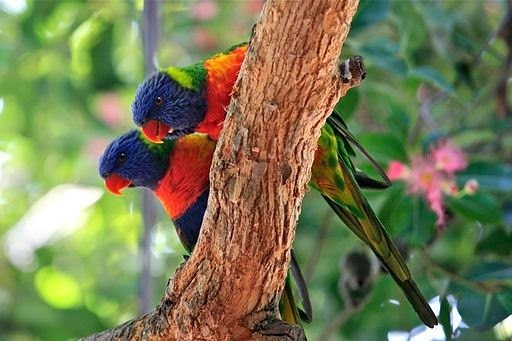 Louise: Happiness. I’ve found it J
Louise: Happiness. I’ve found it J
Tara: I’m a dog mom, so I always ask this. Do you have pets? If so, tell me about them and do provide pictures.
Louise: We don’t have pets beyond a couple of alarmingly large fish in our pond in the yard. But we love the rainbow lorikeets that live in our garden and feed them daily. They sit outside the back door and go through all kinds of attention-seeking antics to attract our attention.
Tara: I had to google that. Never heard of that bird, but oh, so pretty! (Photo is from Wiki Commons)
***
Louise works in the commercial lighting industry, lighting anything from bridges to five star hotels. She loves travelling through the Australian outback with her husband, English aristocracy, live jazz, cooking complicated meals that totally destroy the kitchen, and dining out.
Readers, here's the blurb real quick:
 When English society playboy Jonathan Hartley-Huntley is sent to outback Australia after a disastrous affair with his editor, all he wants is to take a few pictures, do a quick interview and get back to his usual life of luxury as soon as possible. Until he meets his host, the irresistible Charlie Hughes, and suddenly the back of beyond is a lot more appealing.
When English society playboy Jonathan Hartley-Huntley is sent to outback Australia after a disastrous affair with his editor, all he wants is to take a few pictures, do a quick interview and get back to his usual life of luxury as soon as possible. Until he meets his host, the irresistible Charlie Hughes, and suddenly the back of beyond is a lot more appealing.Running the pub is a labour of love for Charlie and she has no desire to ever leave the tiny town of Bindundilly. That is, until Jon discovers an old painting that raises questions about both their lives. Charlie impulsively decides to follow him to London, and as the feelings between them begin to deepen, she starts to wonder if there's more to life than the pub. But at Jon's family home, the magnificent Hartley Hall, they become acutely aware of the differences between them, and it soon seems clear they have no future together – especially if Jon's mother has her way.
Family and tradition threaten the course of true love in this warm and witty novel from the author of Outback Bride and Her Italian Aristocrat.Louise: Hi, Tara. Thank you for having me! Like most of my stories, Red Dirt Duchess was inspired by experiences I’ve had and people I’ve met while travelling. In a remote Australian outback town we visited the hotel and saw the famous mural painted on the wall of the bar by a well-known Australian artist. I’d wanted to write a story with a heroine who owns a pub for ages and decided that this was exactly the sort of place she would own. So I had my setting. A few days later, in another hotel in the middle of the desert, we observed some exhausted tourists walk in, dragging their suitcases. The barmaid was supposed to go out to the airstrip to pick them up but had forgotten. I immediately got the image of a very uptight English aristocrat hero walking into the bar, hot, exhausted and very, very annoyed. Then I knew just the sort of heroine he needed. I had my characters and I was ready to go.
Tara: We focus a lot on heroines here on Book Babe. Tell me what makes your heroine strong.
Louise: Running a hotel in such a remote location calls for my heroine, Charlie, to be resourceful and astute, to have a keen eye for potential trouble but at the same time be welcoming and deal with the whims of customers. I wanted her to exhibit the laid-back nature of so many outback dwellers, but with the sort of quiet strength that is instantly recognisable. Charlie had to deal at a very early age with her mother’s addictions so that primary relationship, although it was loving, was undermined by seeing too much and often having to assume the role of parent. It’s this resilience that stands Charlie in good stead when she becomes the publican of her remote outback hotel.Tara: Do you see any of yourself in her?
Louise: A little. I’m pretty laid-back and down-to-earth and Charlie is the same, which will put her at odds with the uptight English aristocrat hero, Jon. She uses humour to defuse situations which I tend to do as well.
There’s also some cooking in the book and that’s something I love so I indulged myself with descriptions there.
Tara: Was there any particular part of this story that was the hardest for you to write? Tell me why.
Louise: I think it’s difficult to write about parents. We all know people or even have members of our own families who don’t enjoy good relationships with their parents and we see the impact this has on their lives. There’s a lot at play — anger, bitterness and, usually, regret. You can’t be ambivalent about your parents. So in channeling the complex relationships that both Jon and Charlie have with their parents I had to dig deep into a number of places, some my own and others from people close to me.
Tara: What kind of research did you do when you penned this novel? Did anything surprising come up in your search?
Louise: Honestly, I don’t know what writers did before the internet. There are two paintings integral to the plot so I needed to think about the style of painting and how it might have been done, then describe it. So it was off to the art section at the local library There’s a scene at Sotheby’s and since I’ve never attended a fine art auction, I googled images of the outside of Sotheby’s, information on the times of their auctions, how much a painting like the one in the story might sell for and finally — thank you Youtube — viewed a video of an auction taking place. Although I’d been to London several times, I needed to research finer detail about the parts of London where the book was set. Once again Google and Google street view were useful. There’s also the setting of the Stately home in the country and the lifestyle that goes with it. To check several of my facts I spoke to the director of a school for butlers.
Tara: What would you like readers to gain from reading your book? Is there a strong moral? Do you hope they will laugh, learn something about a particular subject/person, ponder a point?
Louise: My primary goal is to entertain and although there are often deeper themes at play, I keep things fairly light. I’d like readers to finish the book with a smile on their face and some lingering thoughts about the characters and settings but I don’t aim to keep them awake at night. In this book I was looking at my hero and heroine’s backgrounds and the idea that we might not be who we think we are. I’d also always wanted to write a book that touched on the English upper classes, more particularly that the lives of some might not be as glamourous as they seem.
 Tara: Your book takes place in both the Australian outback and London. If I were a tourist, what would you recommend I see in these towns?
Tara: Your book takes place in both the Australian outback and London. If I were a tourist, what would you recommend I see in these towns?Louise: The Australian outback is really about vast open spaces punctuated by iconic hotels and roadhouses hundreds of miles apart, cattle stations, wildlife, red dust, blue skies and a timeless landscape. So I’d suggest a road-trip, getting off the bitumen and visiting somewhere like the Darling River. This isn’t your five-star holiday. What it will offer is a glimpse of the lives of the special people who live in these remote circumstances.
In London, there’s so much to choose from. I love London’s squares, the Museums and the history of it all. Favourites would be Bloomsbury and the British Museum.
Tara: Moving on to personal things...if you could time travel to absolute any time and place in history, where and when would you go and what is it that draws you to this time period? What would you do whilst there?
Louise: Another hard question! I think 1920’s London would be fascinating. The horror of WW1 is over and everyone is in the mood to have fun. Women are cutting their hair, shortening their skirts and getting the vote. They’re grabbing for themselves the same freedom as men; drinking, smoking and driving cars. It’s the Jazz Age, a time of wild dancing, nightclubs and fun at all costs. I’d hook up with the Bright Young Things, people like Nancy Mitford and Cecil Beaton, dine at Quaglino’s and go from party to party, drinking champagne and dancing. It must have been an incredible time.
Tara: Oooh. That's a good answer. I think I'd rather love that scene myself..
What’s the one thing you hope to accomplish before you die? Your main goal?
 Louise: Happiness. I’ve found it J
Louise: Happiness. I’ve found it JTara: I’m a dog mom, so I always ask this. Do you have pets? If so, tell me about them and do provide pictures.
Louise: We don’t have pets beyond a couple of alarmingly large fish in our pond in the yard. But we love the rainbow lorikeets that live in our garden and feed them daily. They sit outside the back door and go through all kinds of attention-seeking antics to attract our attention.
Tara: I had to google that. Never heard of that bird, but oh, so pretty! (Photo is from Wiki Commons)
***
Louise works in the commercial lighting industry, lighting anything from bridges to five star hotels. She loves travelling through the Australian outback with her husband, English aristocracy, live jazz, cooking complicated meals that totally destroy the kitchen, and dining out.
Published on August 21, 2014 00:00
August 20, 2014
What Games Did Jane Austen Play? A Guest Post from Syrie James
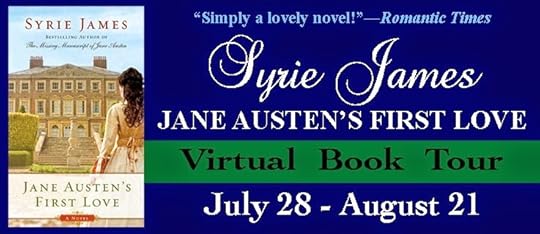
In Jane Austen’s First Love, a young Jane spends a month in Kent with the Bridges family at their country estate, Goodnestone Park, where romance blossoms between her and an extraordinary young gentleman. While there, Jane engages in all sorts of activities. As I researched the novel, I was fascinated to learn about the kinds of amusements that were popular in Georgian England, and in particular, the games that Jane Austen was fond of herself.
Jane Austen and her family were avid game players. In a letter to her sister Cassandra in October 1808, Jane explained how she kept two of her brother Edward’s sons busy while they were visiting her in Southampton after their mother died:
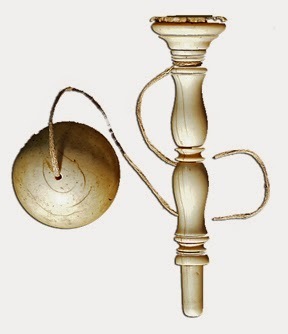
“We do not want amusement: bilbocatch, at which George is indefatigable; spilikins, paper ships, riddles, conundrums, and cards, with watching the flow and ebb of the river, and now and then a stroll out.”
We can imagine Jane making paper ships with her nephews, playing cards, or telling each other riddles. But what are the other amusements to which Jane refers?
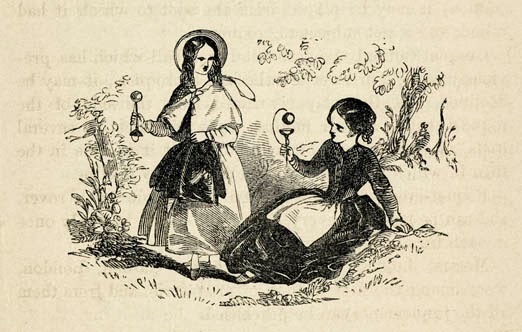 Bilbocatch, also called cup-and-ball, was a simple, traditional child’s toy comprised of a wooden stick with a cup at one end, and a small wooden ball with a hole in it which was attached to the cup by a string. The object of the game was to catch the ball in the cup or on the pointed end. A bilbocatch which belonged to Jane Austen is on display at Chawton Cottage (Jane Austen’s House Museum.) A charming illustration from Lydia Marie Child’s 1838 book, The Girl’s Own Book, shows two young ladies playing the game.
Bilbocatch, also called cup-and-ball, was a simple, traditional child’s toy comprised of a wooden stick with a cup at one end, and a small wooden ball with a hole in it which was attached to the cup by a string. The object of the game was to catch the ball in the cup or on the pointed end. A bilbocatch which belonged to Jane Austen is on display at Chawton Cottage (Jane Austen’s House Museum.) A charming illustration from Lydia Marie Child’s 1838 book, The Girl’s Own Book, shows two young ladies playing the game.Spilikins was similar to a game known today as jackstraws or pick-up sticks. The game originated in the late 16th century and was named after Jack Straw, one of the leaders of an English rebellion in 1381. To play, a group of strips of wood, straws, or toothpicks are spilled in a heap. Players compete by picking up as many straws as possible, one by one, without disrupting the pile. Jane was apparently a skilled player of both of these games, as her nephew, James Edward Austen-Leigh, attests to in his A Memoir of Jane Austen:
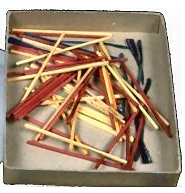
“Jane Austen was successful in everything that she attempted with her fingers. None of us could throw spilikins in so perfect a circle, or take them off with so steady a hand. Her performances with cup and ball were marvellous. The one used at Chawton was an easy one, and she has been known to catch it on the point above an hundred times in succession, till her hand was weary.”
Jane Austen also played “battledore and shuttlecock,” an ancient game that was similar to modern badminton. It was played by two people with wooden racquets (battledores), who batted back and forth a cork shuttlecock trimmed with feathers. As she wrote in 1808 to Cassandra:
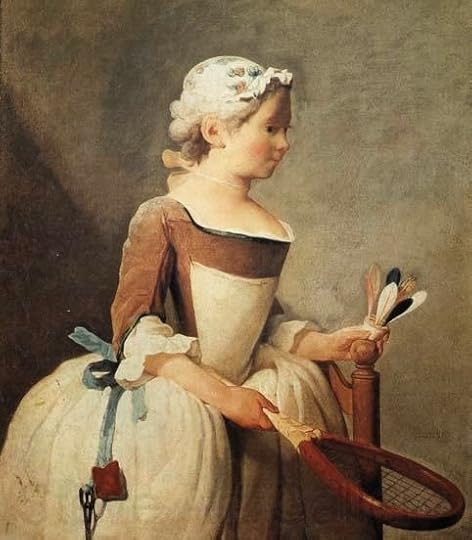 “Yesterday was a very quiet day with us; my noisiest efforts were writing to Frank, and playing at battledore and shuttlecock with William; he and I have practised together two mornings, and improve a little; we have frequently kept it up three times, and once or twice six.”
“Yesterday was a very quiet day with us; my noisiest efforts were writing to Frank, and playing at battledore and shuttlecock with William; he and I have practised together two mornings, and improve a little; we have frequently kept it up three times, and once or twice six.”Jane Austen and her family enjoyed any number of card games, but she was especially fond of speculation. The game, which could be played with two to nine people and required a full 52 card deck, involved bidding on cards. Whoever held the highest trump at the end won the pot. Austen included a telling game of Speculation in Mansfield Park, and wrote of her nephews’ visit in 1808, “I introduced speculation, and it was so much approved that we hardly knew how to leave off.”
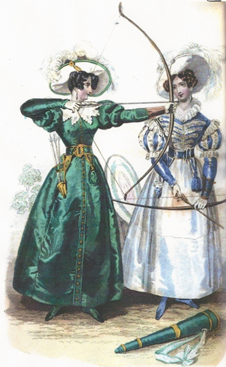
Austen described a variety of parlor games in her novels, such as the charades, alphabet blocks, and conundrums (clever word puzzles) indulged in by the characters in Emma. A dangerous but popular parlor game at the time, Snapdragon, involved snatching raisins out of a bowl of burning brandy, the goal being not to burn one’s fingers! Other amusements during the Georgian era included cricket, billiards, horseback riding, chess, lawn bowling, and archery, many of which are featured in Jane Austen’s First Love. In this excerpt from the novel, Jane writes to her friend Martha Lloyd about the object of her affection, Edward Taylor, and her woes on the archery range:
“As I am already proficient at the sport, he spent all his time teaching Charlotte how to shoot a bow and arrow. How irritating it was to see him standing over her for such a lengthy period, and in such an intimate posture! How I wish he had been instructing me! It seems that a young lady, if she has the misfortune of knowing anything, should conceal it as well as she can.”
***
 Inspired by Actual Events
Inspired by Actual Events Fifteen-year-old Jane Austen dreams of three things: doing something useful, writing something worthy, and falling madly in love. When she visits her brother in Kent to celebrate his engagement, she meets wealthy, devilishly handsome Edward Taylor—a fascinating young man who is truly worthy of her affections. Jane knows a match between her and Edward is unlikely, but every moment she spends with him makes her heart race—and he seems to return her interest. Much to her displeasure, however, there is another seeking his attention
Unsure of her budding relationship, Jane seeks distraction by attempting to correct the pairings of three other prospective couples. But when her matchmaking aspirations do not all turn out as anticipated, Jane discovers the danger of relying on first impressions. The human heart cannot be easily deciphered, nor can it be directed or managed. And if others must be left to their own devices in matters of love and matrimony, can Jane even hope to satisfy her own heart?
***
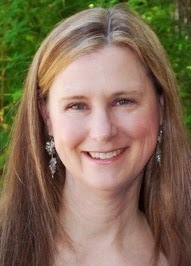 Syrie James is the bestselling author of nine critically acclaimed novels, including The Missing Manuscript of Jane Austen, The Lost Memoirs of Jane Austen, The Secret Diaries of Charlotte Bronte, Nocturne, Dracula My Love, Forbidden, and The Harrison Duet: Songbird and Propositions. Her books have been translated into eighteen foreign languages.
Syrie James is the bestselling author of nine critically acclaimed novels, including The Missing Manuscript of Jane Austen, The Lost Memoirs of Jane Austen, The Secret Diaries of Charlotte Bronte, Nocturne, Dracula My Love, Forbidden, and The Harrison Duet: Songbird and Propositions. Her books have been translated into eighteen foreign languages.
Published on August 20, 2014 00:00
August 19, 2014
Dance of the Spirits by Catherine Aerie Will Dance in Your Mind Long After You Read the Last Page (HFVBT)
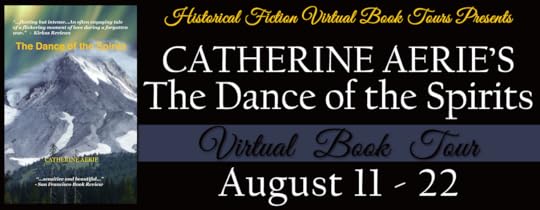
I have so many good things to say about this book... It's eye-opening, insightful, romantic, and contains so much passion in the middle of war. Passion for helping others, passion for survival, passion for each other.
 From the get-go, kudos to the author for tackling the Korean war. There are so few novels about this war. It seems to get lost in the middle of the fascination for the world wars. And even better, this author tells us about the Korean war from a Chinese's viewpoint. What was incredibly fascinating to me and new was how the Chinese people were being taught, or brainwashed so to speak, how many of them just followed blindly and if you didn't, you had a "thinking problem".
From the get-go, kudos to the author for tackling the Korean war. There are so few novels about this war. It seems to get lost in the middle of the fascination for the world wars. And even better, this author tells us about the Korean war from a Chinese's viewpoint. What was incredibly fascinating to me and new was how the Chinese people were being taught, or brainwashed so to speak, how many of them just followed blindly and if you didn't, you had a "thinking problem".And it's not just any Chinese person. It's a woman...surgeon. In the army.
And let me tell you she's amazing. I love her character so much, how strong she is, how considerate. (She uses her own hair for stitching wounds!) I loved her "thinking problem", the way she tried her best to take care of her POWs, get them malaria medicine in the face of her superiors' stubborn and ridiculous ignorance, how she keeps saving as many as she can whether it's her side or the other side, whether she's a POW or a soldier. And she refuses to be brainwashed.
And at points in the story, when I would have just rolled into a ball and gave up, she keeps going. Somewhere inside herself, she has the strength to face endless horror after endless horror, from frozen graveyards to POW camps in which the Chinese fight amongst themselves: those who wish to stay with China and those who wish to leave. She goes from one war to another the entire story, it seems, from war at home: mother versus mistress, Communists versus the Imperialists, from North Korea vs South, to Chinese vs Chinese.
Before she even joins the war, we are educated about the Communist takeover and the staunch ways of the Chinese people.
And I'm leaving out the hero. He's not dominate, really, but he is an American soldier and his path crosses with hers when he saves her and she falls in love with him and he with her, though I felt this could have been expanded on more--will get to that. The hero fights, gets captured, and fights some more--mentally. I love the way he argues with his "comrades" and shows them how silly they are.
But their relationship brings me to my sole complaint. Things are alluded to that we don't have actual scenes of and I feel we could have used the actual scenes in order to help us readers FEEL this love affair. When did she teach him Chinese, for example? When did they have more than that one night in the ambulance and where are the scenes? They were not together enough for me to feel this passion along with them.
In the romance's favor: I honestly could never tell if these two would ever be together again. This added a wonderful feeling of suspense that sadly, most romantic tales do not contain today. From page one, you know you're getting a cheesy HEA. This one kept me wondering.
But still, an incredible book. I learned so much while getting transported to another time and place and met the most incredible heroine.

***
Catherine Aerie, a graduate from the University of California, Irvine with a master degree in finance, grew up in China as the daughter of a Shanghai architect. She was inspired to write The Dance of the Spirits while researching a family member’s role in the Korean War, deciding to revive an often neglected and overlooked setting in fiction and heighten the universality of resilient pursuit of love and liberty. Her debut novel was finished after about two years of research. She currently resides in southern California.
For more information please visit Catherine Aerie’s website. You can also find her on Facebook and Goodreads.
***
The Dance of the Spirits Blog Tour ScheduleMonday, August 11Review at A Bibliotaph’s ReviewsSpotlight at Mina’s BookshelfInterview at Library Educated
Tuesday, August 12Spotlight at CelticLady’s Reviews
Wednesday, August 13Review at Book Nerd
Thursday, August 14Review at Queen of All She Reads
Friday, August 15Review at JM LedwellReview at Based on a True StorySpotlight at Passages to the Past
Monday, August 18Interview at Caroline Wilson Writes
Tuesday, August 19Review at Book Babe
Wednesday, August 20Review at UnshelfishSpotlight at Princess of Eboli
Thursday, August 21Review & Interview Back Porchervations
Friday, August 22Spotlight at Just One More Chapter
***
To win a copy of The Dance of the Spirits please complete the Rafflecopter giveaway form below. Giveaway is open to US & UK residents only.
Giveaway ends at 11:59pm on August 22nd. You must be 18 or older to enter.
Winner will be chosen via Rafflecopter on August 23rd and notified via email.
Winner have 48 hours to claim prize or new winner is chosen.
a Rafflecopter giveaway
Published on August 19, 2014 00:00
August 18, 2014
The Lightkeeper's Wife by Sarah Anne Johnson is a Story Full of Surprises
 If he knew I was a woman, he wouldn't say a word to me, but in men's clothes I've got an opinion worth hearing.
If he knew I was a woman, he wouldn't say a word to me, but in men's clothes I've got an opinion worth hearing.Reading the blurb on this and viewing the cover, you wouldn't think for a moment that it's a story about women's roles in society, about pirates, about lesbian love. Thus, this is one full of surprises.
First of all, it's not explicit. Second, there's a lot to like about this book. Let me think of where to start...
1. I love the many women in this story who battle with what society expects of them and what their heart tells them to do. Hannah is called to the sea and driven to rescue sailors in need. However, her husband believes in merely maintaining the lighthouse lights and waiting until the storm is over and it's too late to save anyone. He doesn't let her out there. There's two lady pirates at some point, fighting alongside men, trying to survive a harsh world. There's even a woman who works in ship building.
2. Turns out (I read the Author Notes) that Hannah was inspired by a woman named Grace Darling, a lightkeeper's daughter in the UK who became famous for rowing into a storm to rescue a drowning sailor. The author also says, "While the male lightkeepers were known for staying ashore to watch the lights, the women became known for rowing into the sea to rescue drowning sailors."
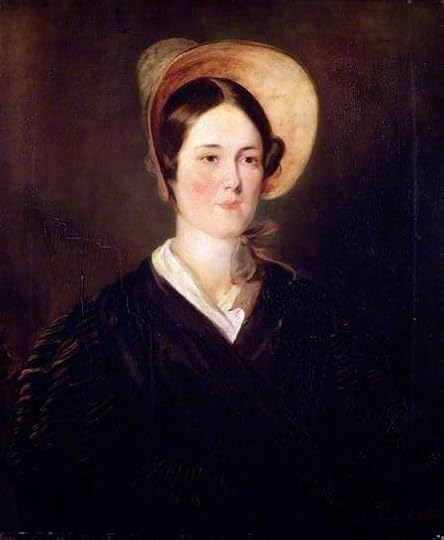 I also recognized that the lady pirates were based on/inspired by Anne Bonney and Mary Reid.
I also recognized that the lady pirates were based on/inspired by Anne Bonney and Mary Reid.3. I loved Hannah's passion for saving people and the way her and Billy work diligently on a special device to do this very thing.
Long story short, it's a tale of women battling their gender roles in the 1840s or thereabouts (pre Civil War), of widowhood, of conflicting emotions, of trying to make up for a poor decisions in the past.
I enjoyed it, especially the tales of piracy, though I had a very hard time liking Annie and understanding her. Her actions seemed strange to me, too abrupt and not quite explained--her sudden hatred of her husband, her coldness, her hate, interest in the ship... I'd have liked the story to get more in depth and explain more clearly somehow why she's so mean after the loss of a baby. Thousands of women lose their babies every day. It was even worse back then. I don't see it being the husband's fault. I thought her manner of retaliation was extreme.
On the other hand, the story did a very good job with Hannah's conflicting emotions. Should she grieve more, harder? Marry again? How does she really feel about Tom, and Billy?
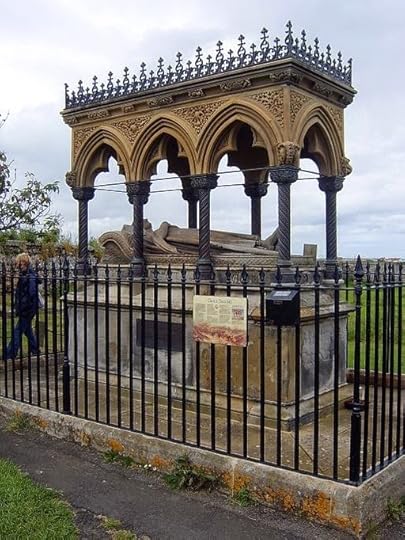 Just for fun:
Just for fun:On Sept 7, 1838, Grace Darling helped rescue four men and one woman from the shipwrecked Forfarshire. She'd been watching from the windows on Longstone Lighthouse and her father and her rowed one mile to reach the wreck. She was lauded as the nation's heroine and even Queen Victoria herself honored her with 50 pounds. Grace fell ill and passed away in 1842 and a monument was erected on Great Ferne Island.
Thank you, Ms. Johnson, for bringing this heroine to my attention.
Further reading:
http://en.wikipedia.org/wiki/Grace_Da...
http://www.gracedarling.co.uk/
I received this via Goodreads Firstreads.

Published on August 18, 2014 00:00
August 17, 2014
Affinity Shows Us Two Very Different Women in Very Different Prisons
 I debated whether to bother reviewing this for Book Babe. I didn't dislike the movie. On the contrary, I was wholly engrossed in it. But it does not contain strong heroines. They are rather weak, really. One is weak in heart, lonely, a prisoner in her own home and way of life. She's a prime example of how one could have every materialistic possession, money, and title, and yet still be miserable and alone. Desperate.
I debated whether to bother reviewing this for Book Babe. I didn't dislike the movie. On the contrary, I was wholly engrossed in it. But it does not contain strong heroines. They are rather weak, really. One is weak in heart, lonely, a prisoner in her own home and way of life. She's a prime example of how one could have every materialistic possession, money, and title, and yet still be miserable and alone. Desperate.She's the perfect prey and easily duped by a young prisoner, another woman, whose prison is an actual cell and perhaps, her own depravity.
I guess the prisoner's character is strong...stronger than the lady's anyway. But she too is weak to things, matters of the flesh, the heart, and overly desirous of what the lady has. Yes, material items can weaken us.
That being said, I'd like to talk about the good things in this movie: It's entertaining, suspenseful, has terrific costumes and settings (Victorian England), and shows us how very rough life in a women's prison was back in these times: their cells, their bathing process, their hair being shorn, their items being stored in drawers and riffled through by whomever wishes to, the dark rooms used for discipline.
There's a supposed spiritual theme too, as the prisoner claims that spirits speak through her. As a matter of fact, a spirit named Peter Quick is, of course!, the actual murderer...not her. *winks*
The acting was superb, as I found myself duped as well. Didn't see the results coming. Not at all.
The cons: The movie was very dark, and I don't mean in nature (which it is) but the lighting. I get London is a rather dark and foggy place at times, but everyday? The prison I expected to be dark, but the rest of it, it seemed they dimmed everything.
My last quibble...as the closing credits rolled by I found myself scratching my head and asking, "So, was Peter Quick fake? Who was that face then? Is she a spiritualist? What the hell?"
I hate being left with questions.
BUT, for those who love a suspenseful period drama, this is a great flick to get your hands on. Note: there is some very mild lesbianism--nothing but kisses. Also note, this is based on a Sarah Waters book, which I have not read.
I bought this DVD on Amazon.

Published on August 17, 2014 00:00



